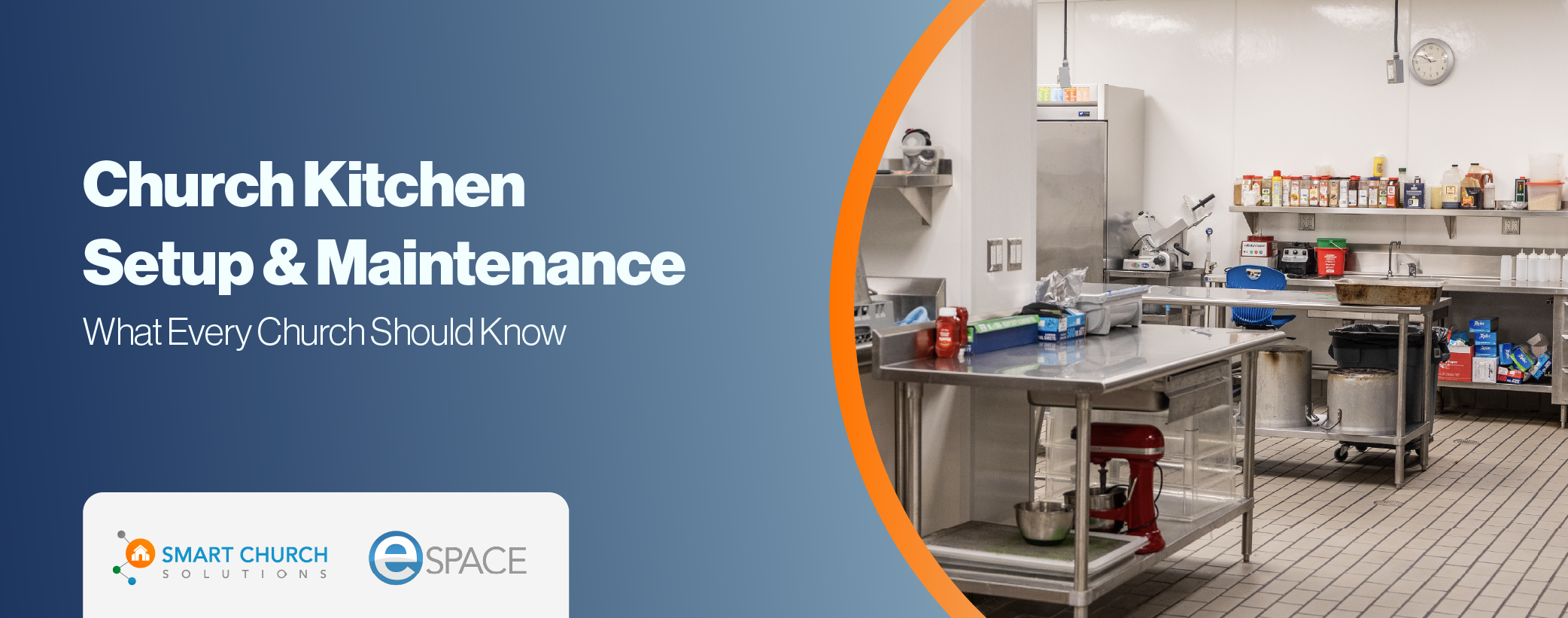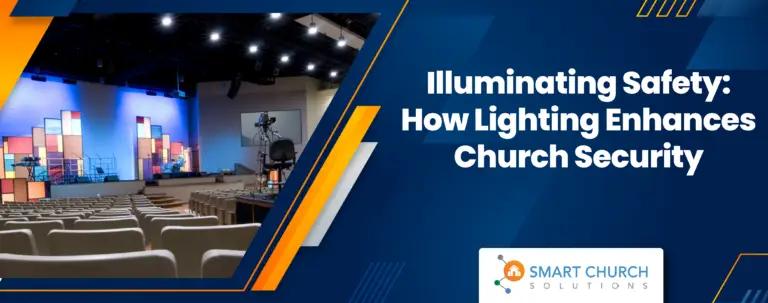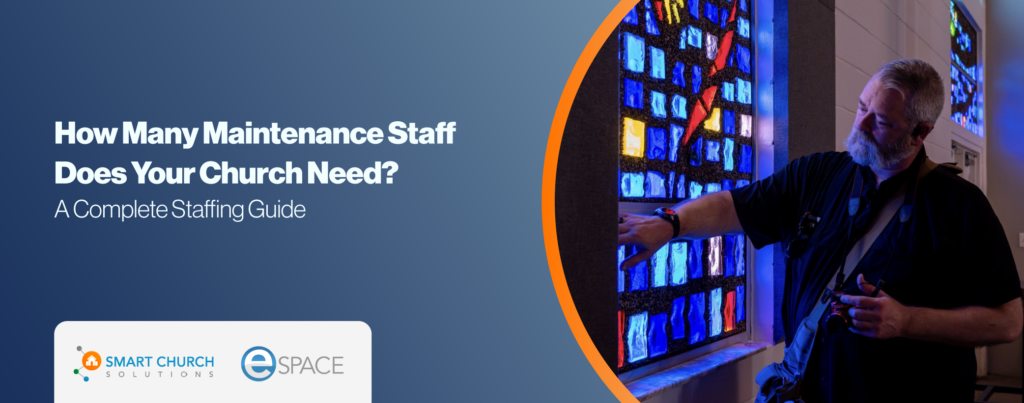A church kitchen can be a powerful tool for ministry—supporting everything from potlucks and coffee hours to outreach meals and special events. But with that potential comes responsibility. Without careful planning and regular maintenance, a church kitchen can quickly become more of a liability than an asset.
From health codes to fire safety, from cleaning schedules to budget concerns, there’s a lot to consider before you build, expand, or even continue using a church kitchen. In this guide, we’ll cover what every church should know about kitchen setup, compliance, upkeep, and when a full commercial kitchen may not be necessary at all..
1. Do You Really Need a Full Church Kitchen?
The Cost of an Oversized Kitchen
Many churches assume they need a fully equipped commercial kitchen when, in reality, they only heat or serve food rather than cook it. If your church kitchen is only used for potlucks, coffee service, or warming pre-packaged food, then a simplified kitchen setup may be more practical.
Smarter Alternatives to a Full Church Kitchen
Before investing in heavy-duty equipment, ask: What do we actually use this space for? If your church doesn’t regularly prepare meals from scratch, consider these alternatives:
- Warming kitchen: Designed for heating and serving pre-made food, with minimal equipment and fewer compliance hurdles.
- Coffee bar or beverage station: Great for hospitality and fellowship, and much easier to manage.
- Food truck partnerships: Host meals onsite without the burden of maintenance or inspections.
- Catering relationships: Rely on local caterers or commissary kitchens instead of cooking in-house.
Don’t assume bigger is better; a full commercial kitchen can be costly to build, maintain, and keep compliant, so choose a setup that fits your church’s actual needs.
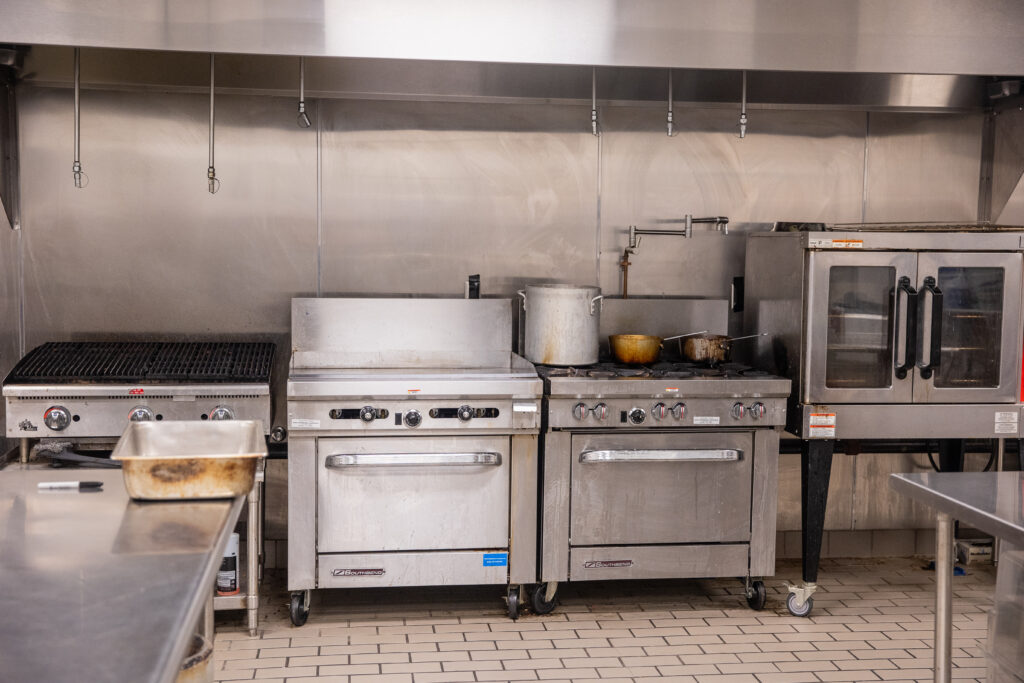
2. Essential Church Kitchen Compliance Requirements
Fire Safety Regulations
Church kitchens that use stoves, ovens, or deep fryers must follow strict fire safety rules to protect the building and its occupants. This often means installing specialized equipment to prevent and quickly respond to kitchen fires. If your church kitchen includes stoves, ovens, or deep fryers, you may be required to install:
- Fire suppression system (Ansul system): Must be inspected twice a year and often connected to a monitored fire alarm.
- Commercial range hood with ventilation: Helps remove grease and smoke to prevent fire hazards.
- Grease trap: Required for proper drainage and must be cleaned regularly to stay compliant.
Health Department Compliance
A church kitchen that prepares and serves food is required to meet local and state health regulations. This typically includes:
- Food handler cards: Volunteers or staff who handle food must be certified.
- First aid & burn kits: Kitchens must be stocked with proper burn blankets and first-aid supplies.
- Temperature control: Refrigerators must be kept at or below 40°F, while hot food must be held at 140°F or above.
- Cleaning protocols: Surfaces, utensils, and equipment must be sanitized before and after use.
Pro tip: If you’re unsure whether your church kitchen meets compliance, check with your local health department before serving meals.
3. Best Practices for Church Kitchen Maintenance
A well-maintained kitchen ensures safety, compliance, and longevity. Here’s how to properly maintain your church kitchen.
Regular Cleaning & Inspections
A neglected kitchen becomes a health and safety risk. Every church kitchen should have a cleaning schedule for:
- Ovens & stovetops: Clean spills immediately and deep clean weekly.
- Ventilation hoods & filters: Grease buildup is a fire hazard—clean and inspect quarterly.
- Refrigerators & freezers: Sanitize shelves and check for expired food monthly.
- Ice machines: Clean ice bins regularly to prevent mold and bacteria growth, and clean air filters to maintain optimal performance and extend equipment lifespan.
- Food prep areas: Sanitize surfaces after every use.
Assign cleaning responsibilities to specific team members to ensure accountability and maintain a consistent, thorough cleaning routine.
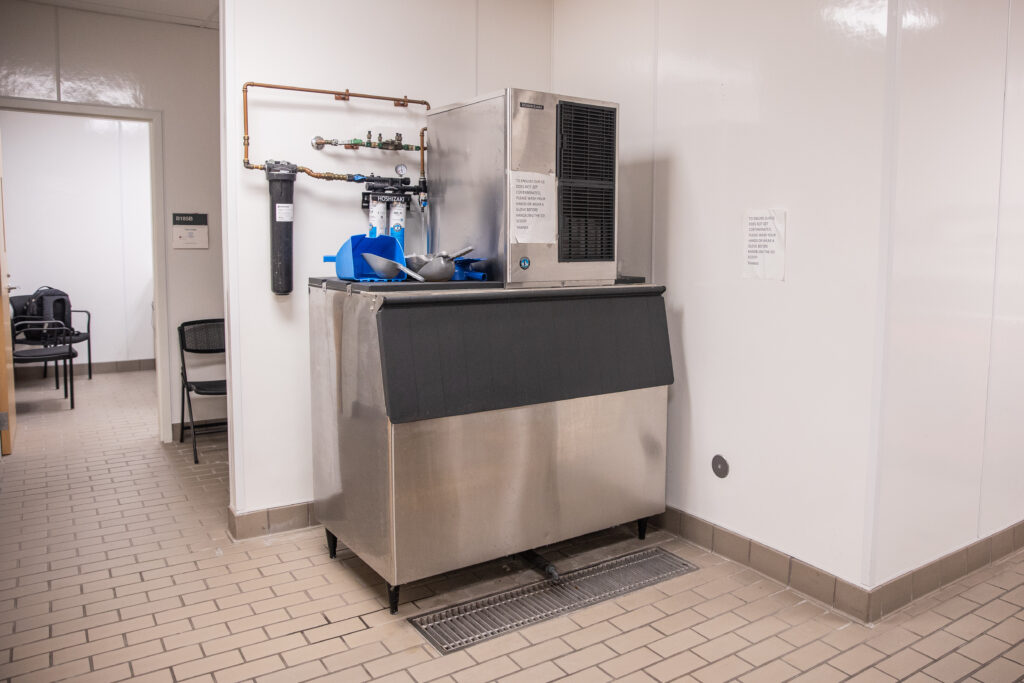
Proper Equipment Maintenance
Commercial kitchens require regular inspections and servicing to remain operational. Key areas to maintain include:
- Grease trap: Must be emptied and serviced on a routine schedule.
- Fire suppression system: Inspected twice a year per fire code.
- Refrigeration systems:
- Weekly: Check and clean shelving and interior: Remove food and wipe down shelves, walls, and bins to prevent mold growth and foul odors. Inspect door operation to ensure doors close tightly and are properly aligned. Misaligned doors can lead to cold air loss and compressor overwork/failure.
- Monthly: Clean condenser coils, check refrigerant lines and insulation, Clean drain pans and tubes, check and calibrate thermometers.
- Quarterly: Inspect evaporator coils and remove any accumulated frost or dirt, and ensure airflow isn’t restricted. Test defrost system to make sure automatic defrost cycles are working properly and prevent ice buildup.
- Dishwashers & sinks: Ensure proper drainage and sanitize filters regularly.
Pro tip: Keep maintenance logs in a facility management system like eSPACE to track inspections and service history.
Train & Certify Kitchen Volunteers
Having volunteers in the kitchen without proper training can be a liability. All church kitchen users should be trained on:
- Food handling safety
- Fire extinguisher use
- Proper sanitation practices
- Grease fire prevention
- First Aid
As best practice, require all volunteers to complete a basic food safety course before working in the kitchen.
4. Repurposing or Downsizing Your Church Kitchen
If your church no longer cooks meals on a large scale, you may want to convert your kitchen into a more functional space. Options for kitchen downsizing include:
- Coffee & beverage station: Transform your kitchen into a coffee shop-style gathering area.
- Multi-purpose room: Use the space for meetings, small groups, or fellowship events.
- Food storage & distribution: Turn it into a food pantry or donation center.
If your kitchen is underused, consider redesigning it to serve your church’s current needs better.
5. Is a Church Kitchen Worth the Investment?
Before committing to a kitchen renovation or building a new commercial kitchen, it’s important to carefully evaluate whether the investment aligns with your church’s actual needs and resources. A kitchen can be costly, not just to build, but to maintain, operate, and keep compliant with safety and health regulations.
Ask yourself these key questions before moving forward:
- How frequently will the kitchen be used throughout the year?
- Do you have enough trained staff or volunteers to properly maintain and operate the kitchen?
- Is your church prepared to meet ongoing compliance requirements, including health codes and fire safety regulations?
- Would alternatives like partnering with food trucks, caterers, or using a warming kitchen better serve your community’s needs without the overhead?
If your church hosts an on-site school, daycare, or outreach program that regularly prepares and serves meals, investing in a fully equipped commercial kitchen may be a wise decision. On the other hand, if the kitchen is only used sporadically—such as for occasional events or potlucks—maintaining a full-scale kitchen could lead to unnecessary expenses and regulatory burdens.
Careful planning ensures your kitchen supports ministry effectively without becoming a financial or operational drain.
Conclusion: Making the Right Choice for Your Church Kitchen
A church kitchen can be an important asset for ministry and fellowship, but it demands thoughtful planning, consistent upkeep, and adherence to safety and health regulations. Without these, a kitchen can become costly, inefficient, or even a liability.
Before setting up or maintaining your kitchen, consider the following essential steps:
- Assess whether a full commercial kitchen is truly necessary for your church’s needs.
- Ensure compliance with all fire safety and health department regulations to protect your facility and congregation.
- Develop and follow a regular maintenance and cleaning schedule to keep the kitchen safe and operational.
- Provide proper training and certification for all volunteers and staff who work in the kitchen.
- Explore alternative food service options, such as catering or food trucks, especially if your kitchen is rarely used.
If your kitchen is underutilized, downsizing or repurposing the space may free up valuable resources and better serve your church’s current ministry goals.
For churches looking to simplify facility management, eSPACE offers tools to help schedule kitchen use, track maintenance tasks, and stay compliant with regulations, making kitchen stewardship easier and more effective.


